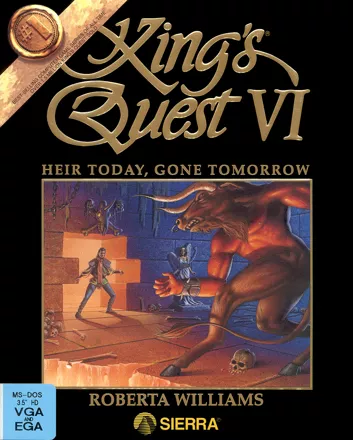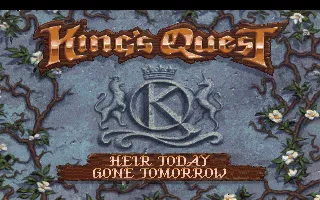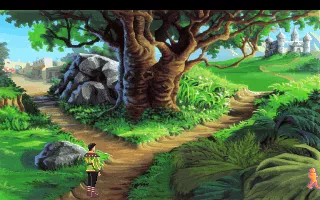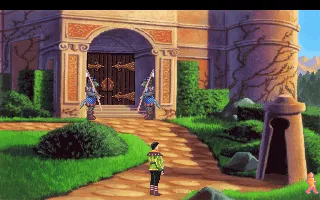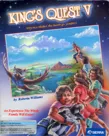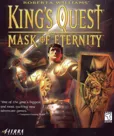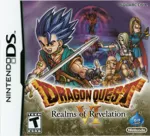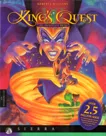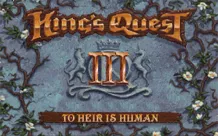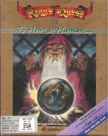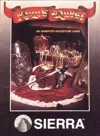King's Quest VI: Heir Today, Gone Tomorrow
Description official descriptions
For months Prince Alexander of Daventry has shut himself away from the world, thinking only of Princess Cassima, who he met while imprisoned in the previous game. Eventually he can take it no longer, and he hires a ship to search for the Land of the Green Isles located on the edge of the world. After months of searching he finally sets sight upon the island kingdom, only for a freak storm to strike the ship, destroying it and leaving him the only survivor. His troubles are far from over, however, as he soon finds out that the King and Queen have passed away, the Greens Isles are on the brink of war, and his beloved Princess Cassima may even be held prisoner by the royal vizier.
Like its predecessors in the series, King's Quest VI: Heir Today, Gone Tomorrow is a third-person puzzle-solving adventure game. For Alexander to save the Isles, he must travel between the Land's four magical islands, each based on myth and fables, and encounter people and strange beasts that will either help or hinder him. Alexander must be careful as well, because, as with all the King's Quest games, poor choices or missteps will often prove fatal for the Prince. Puzzles are solved linearly, although late in the game there are two completely different paths to take to reach the final confrontation. Like the previous game, actions are performed using a point-and-click interface with icons that represent verbs ("walk", "examine", "use", "talk", etc.).
The CD-ROM version of the game includes both DOS and Windows versions, full speech, a pre-rendered introduction, and the Girl in the Tower theme song.
Spellings
- 國王密使 VI:希望之旅 - Traditional Chinese spelling
Groups +
Screenshots
Promos
Credits (DOS version)
39 People (37 developers, 2 thanks) · View all
| Written & Designed by | |
| Produced by | |
| Directed by | |
| Art Designer | |
| Composer | |
| Text & Dialogue | |
| Senior Artist | |
| Team Artist | |
| Senior Programmer | |
| Sound | |
| Team Programmer | |
| Additional Music | |
| Quality Assurance | |
| Additional Sound Effects | |
| [ full credits ] | |
Reviews
Critics
Average score: 83% (based on 26 ratings)
Players
Average score: 4.0 out of 5 (based on 164 ratings with 11 reviews)
Classic adventure with a pretty facelift
The Good
King's Quest 6 plays as a classic fairy tale might. The plot is unusually complex and rich for the series, thanks to contributions by Gabriel Knight writer/designer Jane Jensen, who's design methods complemented Roberta Williams' perfectly in this installment.
The plot itself has been done before, even in the series (Prince Alexander sets out to rescue his love after seeing her trapped in a tower through an enchanted mirror), but the flair and atmosphere with which the game executed is phenomenal. Charmingly quirky at times and dark and mysterious at others, the game provides brain-teasing puzzles set against a vibrant environment that ranges in influence from Arabian Knights to Alice in Wonderland.
Beauty and the Beast's Robbie Benson does a solid job as the protagonist, and its ironically funny to hear him interact with the game's own equivalent of Beast. This was also the first entry in the series to offer multiple solutions to solve the game, one of which permitted you to skip a good 1/3rd of the game (this component was half-heartedly featured in the series' next installment as well).
The Windows version features newly-detailed character portraits that are a nice, if unnecessary, addition.
The Bad
Despite the multiple paths, the game's replayability factor is somewhat limited. Some of the puzzles are unnecessarily frustrating (this is during a time when Sierra cruelly worked anti-piracy techniques into the game's structure, frustrating those who owned legitimate copies), requiring you to save often and reattempt all-too-often. It's also very easy to miss something or make a mistake that will have fantastically bad and unforeseen consequences for the future. One such puzzle involves descending to the underworld to save the love interest's parents, only to discover that if when you get back, you forgot to pick up water from the River Styx, you are stuck without recourse and must load from a previous save. There are several instances like this where even people who have played the game multiple times before (myself included) can easily get stuck.
The Bottom Line
If you're an adventure gamer, you've already played this, and I don't have to say anything. If you're just getting into the series or the genre, this is an essential. A true classic.
Windows 3.x · by jTrippy (58) · 2007
The Good
Like so many other players, I was (and still am) in love with classic Sierra adventure games. I've played many of them, and found most of them charming and fun. I enjoyed their early King's Quest games; I think they are all good games with their own quirks and forgivable flaws. But I also thought they lacked something - perhaps stronger writing and better overall direction. King's Quest VI seems to address precisely those issues.
A look at the credits will clearly tell you: the text in the game was written by Jane Jensen, the master storyteller of Gabriel Knight fame. I think it's pretty useless to try and find out who was involved more with the game - she or Roberta Williams. The traditional reliance on fairy tales shows Roberta's influence. The writing, while undeniably good, doesn't really betray its author. I don't think it really matters much. The point is that the text in King's Quest VI is a joy to read. It's intelligent, entertaining, and full of subtle, fine humor. None of the other King's Quests came close to that quality.
I say "text" instead of "dialogue" because, in the finest tradition of true adventure games, King's Quest VI relies on text messages to create atmosphere. Most of those old Sierra adventures worked so well, in spite of their shortcomings, because they were built as a continuous conversation between the player and the game. The game would react to your actions, award you with a smart or witty message, guide you, give explanations, and ultimately tell the story. The biggest fun was to use all possible actions on all possible objects; and the game's job was to entertain you with its responses.
King's Quest VI is absolutely impeccable in that way. The game allows you to experiment by giving you different responses to different actions. It's truly heart-warming to see that the developers tried to create unique text messages for pretty much every action you could think of performing. You will see very few "You can't do that" messages, but rather elaborate descriptions of what you are trying to do. If you fail, the game will tell you why you failed. If you try talking to everything you see, you won't be given the standard "You get no response from that" all the time. Have you tried talking to a tomato in your inventory? It will complain about its abduction and request a lawyer. Have you tried fooling one of the dwarf guards with a flute? He will respond with a different short verse which the creators of the game specifically composed just because they thought some of the players might use the flute in this place - even though this action doesn't solve the puzzle and also doesn't make that much sense. The beauty of that is that most of those actions are not necessary to perform. You don't have to do things, but you can. For me, this is the main reason why I consider older adventure games far superior to the "post-Myst" ones.
The humor of King's Quest VI is perhaps what distinguishes it most drastically from its brethren. It is not entirely a comedy adventure; perhaps more serious than Monkey Island, it still maintains a wonderfully humorous tone all the way through. What I particularly loved about this humor that it never went too far. It was tactful from the beginning to the end, careful not to destroy the magical fairy tale-like atmosphere of the game, always fitting it stylistically. The game is full of charming, memorable encounters and moments - reading the "boring" book to the oyster, convincing the beauty to marry the beast, faking suicide in front of the genie, and many others.
The world of King's Quest VI is rich and imaginative, even though it resembles a potpourri of totally unrelated styles more than anything else. The most important island is clearly Middle Eastern, but the other areas could be Greek, Celtic, or even taken from Alice in Wonderland. This last one was my particular favorite, some of the characters being poetically grotesque, like the talking plants (gotta love the coquettish female sunflowers!) and the two queens. I loved the part where those queens quarreled over a piece of coal, and Alexander had to bring them another one to appease them; they immediately started arguing whose piece of coal is larger and more beautiful. There is wisdom in some of the game's humor, and overall it is clear that the game targets adults this time.
As always, the story of King's Quest VI is a fairy tale; but even as such, even falling under the overused "rescue the princess" category, this story is touching and memorable. It's all done through text and characterization; it's the little things that make the difference. As an example, take the whole catacombs part. It's just a usual "save the girl" quest, but it's full of nuances that make it different. The "noble" rulers send the innocent Alexander to a certain death, and don't even bother to hide that; Alexander knows it and comments upon it, but is still determined to rescue the girl, because he is brave enough to face any danger if that helps him on his mission. The girl herself barely thanks Alexander; the whole episode intentionally leaves a bitter taste in the player's mouth. That's how a simple "childish" fairy tale turns into something that gives you food for thought.
The gameplay clearly breaks away from the "run around collecting junk on the way, and then pray that you'll give the right piece of junk to the right guy, because otherwise you won't be able to finish the game" kind of philosophy that really started to feel stale in the two previous installments. Now, I can't honestly say that King's Quest VI is completely devoid of all those flaws. There are actions that could prevent you from finishing the game, moments that require restoring; there is a bit of clueless wandering, and there is also gathering of items that seem to have no purpose until the one rare moment when you'll need them, which you certainly won't be able to predict. But overall, the gameplay here is noticeably better directed than in most of its predecessors, perhaps with the exception of the third. Some of the puzzles are cleverer than anything we've seen in the series so far, and most clues are reasonably well-placed.
Keeping up with the tradition of the series, King's Quest VI is also fairly open-ended. There are two different ways to finish the game, one long and one short - naturally, the longer one rewards you with a better ending, but the short path is great when you're impatient to reach the end. Many of the actions that award you with points are not necessary to perform in order to finish the game in either way. There is plenty of freedom to walk around, explore, communicate, and try things out.
And finally, the production values in this game are absolutely top-notch. Even compared to other Sierra games of that period, which were all gorgeous, having magnificent visuals and music, King's Quest VI stands out. It has incredible graphics with realistic animations, wonderful close-up scenes, and a fantastic soundtrack. The voice acting is better than in many modern high-budget games. The pre-rendered 3D intro is positively stunning; I don't think any other game of that time had anything of the kind.
The Bad
I doubt whether there is anyone who loves venturing far into a game only to discover that he forgot to collect a crucial item and will therefore have to restore a much earlier save and replay a large portion of the game. To be fair, there aren't many occasions like that in King's Quest VI - definitely not as many as in is predecessors. But I'd still prefer not to have them at all by now. Such extension of a game's life worked in the first installment with its sparsity, but is out of place in a busy world with an abundance of items and characters.
Sometimes the game helps you against its own rules - for example, you can't enter the catacombs until you have the necessary items (at least that's what happened to me - maybe the game does punish impatient players for allowing access to catacombs without the needed items after several tries). The problem here is that the choice of items needed in the catacombs makes little sense. I suppose that the fact that Minotaur is a kind of a bull is a subtle clue to one of the items; but another one, which is needed to escape from a deadly trap, doesn't look at all like something you'll require in a dangerous dungeon. Same applies to some of the items needed to get into the castle. Many instances require swapping items at the pawn shop, which I didn't find very exciting at all.
The Bottom Line
King's Quest VI is full of charisma that transcends the series, taking it to a higher ground from which it will soon fall down again (yes, I'm talking about the sequel). Far from being just a nostalgic reminiscence, King's Quest VI stands out as one of the finest examples of classic adventure.
DOS · by Unicorn Lynx (181726) · 2014
Ahh ... Romance ... ain't it grand?
The Good
There were 2 years separating this game and its predecessor, King's Quest 5, a game which was criticized by many, even though it was one of the first to introduce a mouse-driven interface. Because of all that criticism, it's no wonder Sierra decided to go "back" to what had been successful in the past - somewhat anyway.
The graphics, as others pointed out, are stunning. I found the music lovely and so very romantic. (We females tend to like mushy love stories, ya know.) I simply adore plots about heroes saving damsels in distress. This hero is handsome and the princess is beautiful. What good looking children they will make! And ... oooh ... the ending - you must see the ~kiss~. I remember getting goosebumps watching it. I was satisfied knowing they would live "happily ever after."
The Bad
I played KQ6 when it was new, so it is hard to remember. I don't recall anything about it I didn't like.
The Bottom Line
If you long for a classic tale of love and honor, this game's for you! This is the last game in the series that retained the original look and feel of the originals. Recommended for adults and children alike, it would make a fine addition to any collection.
DOS · by Jeanne (75918) · 2001
Trivia
Amiga version
The back cover of the Amiga version contains information: "Beautiful graphics in 256 colours or 32 colours (two versions available)." but the game was released only in 32 colours version.
According to KQ VI reviews in Amiga Computing, Amiga Format and Amiga Power magazines Sierra originally planned to release a 256 colours version but decided that 32 colours version looked so good already so they shelved the idea.
The game was ported to the Amiga by Revolution Software, though the company wasn't credited on the box or in the manual. This is why this version uses Revolution's Virtual Theatre engine instead of SCI.
CD version
The CD version of King's Quest VI includes Girl in the Tower , the theme song to the game, composed by Mark Seibertm in full length. A sample of it can be heard on the floppy version for five seconds, then the game urges you to ring up radio stations that was listed in the manual and request it. Also the introduction was also extended in the CD version.
Music
Chris Braymen, the game's composer, quoted a Gregorian chant (Dies Irae) in the theme that plays when Prince Alexander is captured in the Catacombs of the Isle of the Sacred Mountain. It's a famous theme, quoted as well in many classical compositions such as Berlioz' Symphonie fantastique (5th part), in Stanley Kubrick's films The Shining and A Clockwork Orange, and also in Indiana Jones and the Fate of Atlantis (Room of the God Machine).
References
King's Quest VI's villain is named Abdul Alhazred; this name was taken from the work of horror and sci-fi writer H.P. Lovecraft. Abdul was a fictional character (also dubbed ''the Mad Arab'') who wrote the Necronomicon.
Technology
This was Sierra's first adventure game to feature their lipsyncing technology that they got when they bought out Bright Star Technology.
Awards
- Power Play
- Issue 02/1993 – #2 Best Presentation in 1992
Information also contributed by B14ck W01f, B.L. Stryker, game nostalgia and Jiguryo
Analytics
Upgrade to MobyPro to view research rankings!
Related Sites +
-
Game Nostalgia
Provides extensive background info for King’s Quest VI: Heir Today, Gone Tomorrow, pictures of the cast and examples of voice-overs, full credits with shots and info about the design team, demo of the game, specific details about the game, various goodies, all musical themes, shots of every location in the game, video clips, saved games, a list of reviews, including a "nostalgic" review and tech specs. -
Hints for KQ6
These hints will help you solve the game.
Identifiers +
Contribute
Are you familiar with this game? Help document and preserve this entry in video game history! If your contribution is approved, you will earn points and be credited as a contributor.
Contributors to this Entry
Game added by Andy Roark.
Amiga added by POMAH. Windows 3.x added by Mr. Huh. Macintosh added by Terok Nor.
Additional contributors: Adam Baratz, Katakis | カタキス, Jeanne, formercontrib, game nostalgia, Paulus18950, Patrick Bregger.
Game added May 23, 1999. Last modified April 2, 2024.
